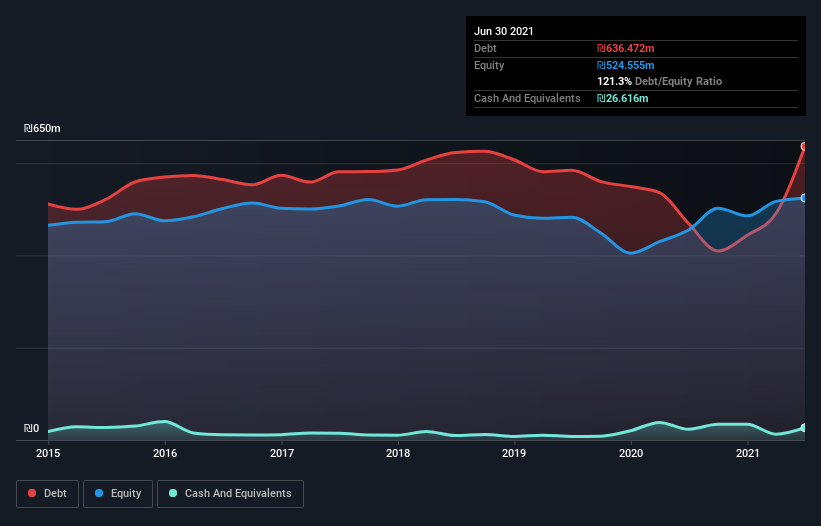- Israel
- /
- Household Products
- /
- TASE:ALBA
Albaad Massuot Yitzhak (TLV:ALBA) Takes On Some Risk With Its Use Of Debt

David Iben put it well when he said, 'Volatility is not a risk we care about. What we care about is avoiding the permanent loss of capital.' When we think about how risky a company is, we always like to look at its use of debt, since debt overload can lead to ruin. We can see that Albaad Massuot Yitzhak Ltd (TLV:ALBA) does use debt in its business. But the more important question is: how much risk is that debt creating?
When Is Debt Dangerous?
Debt is a tool to help businesses grow, but if a business is incapable of paying off its lenders, then it exists at their mercy. If things get really bad, the lenders can take control of the business. However, a more common (but still painful) scenario is that it has to raise new equity capital at a low price, thus permanently diluting shareholders. By replacing dilution, though, debt can be an extremely good tool for businesses that need capital to invest in growth at high rates of return. When we examine debt levels, we first consider both cash and debt levels, together.
View our latest analysis for Albaad Massuot Yitzhak
How Much Debt Does Albaad Massuot Yitzhak Carry?
As you can see below, at the end of June 2021, Albaad Massuot Yitzhak had ₪636.5m of debt, up from ₪469.0m a year ago. Click the image for more detail. However, it also had ₪26.6m in cash, and so its net debt is ₪609.9m.

How Strong Is Albaad Massuot Yitzhak's Balance Sheet?
Zooming in on the latest balance sheet data, we can see that Albaad Massuot Yitzhak had liabilities of ₪580.4m due within 12 months and liabilities of ₪699.1m due beyond that. Offsetting this, it had ₪26.6m in cash and ₪337.3m in receivables that were due within 12 months. So it has liabilities totalling ₪915.6m more than its cash and near-term receivables, combined.
The deficiency here weighs heavily on the ₪382.4m company itself, as if a child were struggling under the weight of an enormous back-pack full of books, his sports gear, and a trumpet. So we definitely think shareholders need to watch this one closely. At the end of the day, Albaad Massuot Yitzhak would probably need a major re-capitalization if its creditors were to demand repayment.
We use two main ratios to inform us about debt levels relative to earnings. The first is net debt divided by earnings before interest, tax, depreciation, and amortization (EBITDA), while the second is how many times its earnings before interest and tax (EBIT) covers its interest expense (or its interest cover, for short). Thus we consider debt relative to earnings both with and without depreciation and amortization expenses.
We'd say that Albaad Massuot Yitzhak's moderate net debt to EBITDA ratio ( being 2.4), indicates prudence when it comes to debt. And its commanding EBIT of 10.4 times its interest expense, implies the debt load is as light as a peacock feather. Importantly, Albaad Massuot Yitzhak grew its EBIT by 68% over the last twelve months, and that growth will make it easier to handle its debt. The balance sheet is clearly the area to focus on when you are analysing debt. But you can't view debt in total isolation; since Albaad Massuot Yitzhak will need earnings to service that debt. So if you're keen to discover more about its earnings, it might be worth checking out this graph of its long term earnings trend.
Finally, while the tax-man may adore accounting profits, lenders only accept cold hard cash. So we always check how much of that EBIT is translated into free cash flow. In the last three years, Albaad Massuot Yitzhak's free cash flow amounted to 35% of its EBIT, less than we'd expect. That's not great, when it comes to paying down debt.
Our View
While Albaad Massuot Yitzhak's level of total liabilities has us nervous. To wit both its EBIT growth rate and interest cover were encouraging signs. When we consider all the factors discussed, it seems to us that Albaad Massuot Yitzhak is taking some risks with its use of debt. So while that leverage does boost returns on equity, we wouldn't really want to see it increase from here. When analysing debt levels, the balance sheet is the obvious place to start. However, not all investment risk resides within the balance sheet - far from it. These risks can be hard to spot. Every company has them, and we've spotted 3 warning signs for Albaad Massuot Yitzhak (of which 1 doesn't sit too well with us!) you should know about.
When all is said and done, sometimes its easier to focus on companies that don't even need debt. Readers can access a list of growth stocks with zero net debt 100% free, right now.
If you're looking to trade Albaad Massuot Yitzhak, open an account with the lowest-cost platform trusted by professionals, Interactive Brokers.
With clients in over 200 countries and territories, and access to 160 markets, IBKR lets you trade stocks, options, futures, forex, bonds and funds from a single integrated account.
Enjoy no hidden fees, no account minimums, and FX conversion rates as low as 0.03%, far better than what most brokers offer.
Sponsored ContentNew: Manage All Your Stock Portfolios in One Place
We've created the ultimate portfolio companion for stock investors, and it's free.
• Connect an unlimited number of Portfolios and see your total in one currency
• Be alerted to new Warning Signs or Risks via email or mobile
• Track the Fair Value of your stocks
This article by Simply Wall St is general in nature. We provide commentary based on historical data and analyst forecasts only using an unbiased methodology and our articles are not intended to be financial advice. It does not constitute a recommendation to buy or sell any stock, and does not take account of your objectives, or your financial situation. We aim to bring you long-term focused analysis driven by fundamental data. Note that our analysis may not factor in the latest price-sensitive company announcements or qualitative material. Simply Wall St has no position in any stocks mentioned.
Have feedback on this article? Concerned about the content? Get in touch with us directly. Alternatively, email editorial-team (at) simplywallst.com.
About TASE:ALBA
Solid track record with mediocre balance sheet.
Market Insights
Community Narratives



